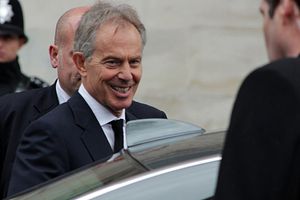Five years ago, former British Prime Minister Tony Blair began one of the most reportedly lucrative chapters of his career: advising the Kazakhstani government. Technically, Blair’s financial remuneration from his work with Astana has never been confirmed; the estimated largesse ranges from $13 million to $27 million annually. Likewise, Blair has repeatedly denied that he’s received any personal compensation from his venture, which has seen him become a font for Astana’s talking points, whether in staking that Kazakhstan had an unparalleled diversity or in falsely claiming that Kazakhstan was the only country to give up nuclear weaponry.
Whatever the final finances, there’s little question Blair’s network has benefited inordinately from the former prime minister’s willingness to stump for a post-Soviet dictatorship. In the United States, according to governmental records, the lone public relations firm helping massage Astana’s image is Portland Communications Ltd. — an outfit founded by Blair’s former adviser and PR head, Tim Allan.
And now, numbers are starting to roll out that help illustrate how much compensation the law firm of Blair’s wife, Cherie Blair, has received for helping the Kazakhstani government. Originally contracted in 2014 to help review Kazakhstan’s “bilateral investment treaties,” Cherie Blair’s Omnia Strategy raked in over $2.2 million from April 2014 to April 2015, according to The Telegraph.
To be sure, not all of those funds necessarily come from work with Astana. Omnia has also worked with the governments in Albania — where Blair serves as an adviser — and the post-coup leadership of the Maldives. But Cherie Blair’s work with Kazakhstan, much like her husband’s, has earned the most notoriety. As The Telegraph explained, Cherie Blair “is understood to have offered her Kazakh clients a reduced hourly billing rate” of some $1,360 per hour, “ultimately picked up by the country’s taxpayers.” All told, the agreement with Kazakhstan is worth nearly $700,000.
While the Blairs remain firmly ensconced in aiding the government in Kazakhstan — which has just detained another pair of journalists — Astana may well be wondering what, if anything, they’ve ever gotten out of the agreement. President Nursultan Nazarbayev is no closer to earning the Nobel Peace Prize he reportedly commissioned Blair to land, and Kazakhstan failed to win the competition to host the 2022 Winter Olympics. As hydrocarbon coffers run dry, the government has notably cut back on its efforts to sway Western audiences, with fewer television commercials and junkets resultant. An English-language outlet with ties back to Astana was even forced to close last month.
And now, a new round of news reports are reminding (or perhaps introducing) Western audiences of the lengths to which Astana went to distance itself from 2006’s Borat, which used Kazakhstan as a foil to critique American views. At the time, Kazakhstani authorities effectively banned Borat from screening in Kazakhstan. And a few days ago, Sacha Baron Cohen — the brain behind Borat — revealed that the Kazakhstani prime minister went so far as to formally ask that Britain itself prevent the movie’s release.
The British government, of course, declined to honor Astana’s request.

































